GENEVA (Reuters) - The World Health Organization is seeking faster and cheaper tests to detect the Ebola virus to help stamp out the last few cases of the deadly fever once the main epidemic has been tackled, WHO officials said on Tuesday.
The world's worst ever outbreak of Ebola has killed over 5,000 people, almost all in Liberia, Sierra Leone and Guinea. While the number of cases has been falling in Liberia, the outbreak remains out of control with continuing spread in Sierra Leone and parts of Guinea and a new cluster of cases in Mali.
Ebola tests currently take 2-6 hours to deliver a result and are "cumbersome, slow and complex", requiring a full tube of blood, sophisticated equipment, trained staff and a high level of bio-safety, the WHO's Pierre Formenty said.
Labs in Ebola-hit countries currently test 1,000-1,200 samples per day and could test as many as 2,000, but a faster and more agile testing strategy is needed, Formenty, an expert in emerging and epidemic diseases, told a news conference.
Slow test speeds have contributed to Ebola's spread with clinics unable to quickly separate Ebola and non-Ebola patients, and getting samples to laboratories can take hours or days.
Small and cheap testing kits will be crucial for the aggressive testing needed to finally declare the outbreak over, according to Formenty. "We have missed several chains of transmission in the population, in the community, and we need to find these ones to be able to say that the outbreak is over.
"We are also looking at where we will be in 4-6 months from now when the cases hopefully are going to decrease sharply and we will be trying to find the very last cases and notably we are going to reopen non-Ebola facilities," he said.
The WHO hopes to find a test that can yield results in 30 minutes and can be easily stored, with no need for a power supply or maintenance and no bio-safety requirements beyond the usual personal protective gear worn for treating Ebola patients.

Ideally it should take less than half a day to train somebody in how to use it, WHO experts say.
(Reporting by Tom Miles; Editing by Mark Heinrich)